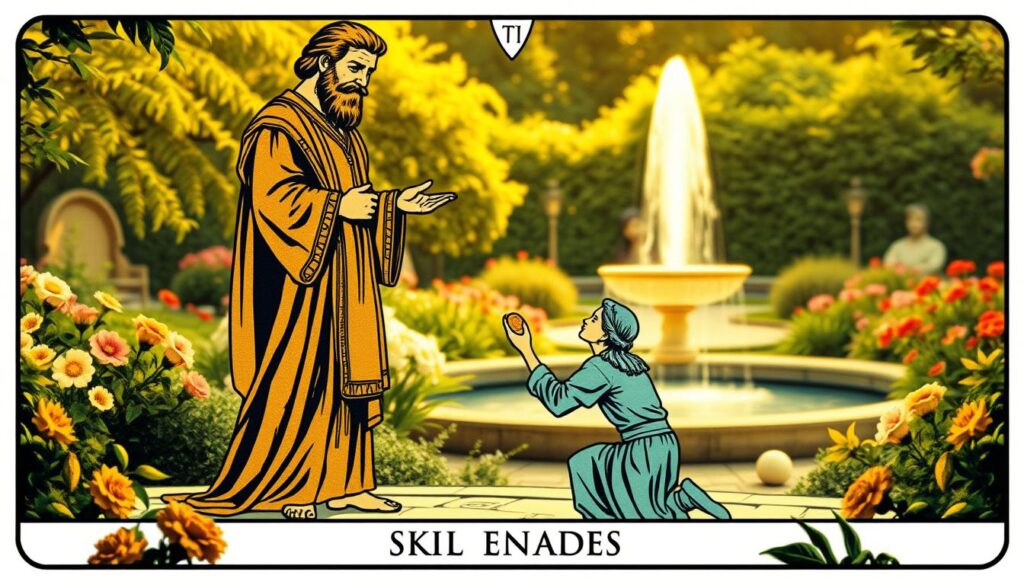The Six of Pentacles is a powerful tarot card that teaches the art of balanced generosity. It reminds us that true abundance isn’t just about giving—it’s about creating harmony between sharing and receiving. This card’s imagery, often featuring scales and coins, symbolizes fairness in both material and emotional exchanges.
In modern readings, this card speaks to financial support, workplace recognition, and even relationship dynamics. It encourages us to reflect on our roles—whether we’re the giver, the receiver, or both. The message is clear: healthy community thrives on mutual respect and shared resources.
Upright, it highlights gratitude and thoughtful giving. Reversed, it warns against power imbalances or one-sided generosity. Whether in finances or personal connections, the Six of Pentacles calls for balance—a lesson we all need today.
Key Takeaways
- This tarot card symbolizes fair exchanges in wealth and kindness.
- True abundance comes from balanced giving and receiving.
- Upright, it represents gratitude and supportive generosity.
- Reversed, it warns of dependency or unfair power dynamics.
- Applies to finances, relationships, and workplace fairness.
Understanding the Six of Pentacles Tarot Card
Purple robes and balanced scales tell a deeper story. This tarot card uses vivid imagery to explore the ethics of generosity. The wealthy figure’s fine clothing contrasts sharply with the beggars’ rags, highlighting societal divides.

Symbolism and Imagery
The figure’s purple robes symbolize wealth and high status. His hand pours coins while another holds scales—a nod to karmic justice. “Balance isn’t just measurement; it’s intention,” reflects a tarot scholar.
Two kneeling beggars receive coins, their posture underscoring power dynamics. The castle backdrop suggests distance between privilege and need. Here, the card challenges viewers to question fairness in resource distribution.
Key Themes: Generosity and Balance
At its core, this card teaches fairness. The scales remind us that giving should empower, not control. Emotional and material resources flow both ways in a healthy community.
Modern parallels abound: workplace mentorships, equitable charity, or even relationship reciprocity. The lesson? True abundance thrives when givers and receivers stand on equal ground.
Upright Six of Pentacles Meaning
True wealth isn’t just about having—it’s about sharing wisely and receiving graciously. The upright position of this card celebrates generosity that uplifts without creating dependency. It’s a reminder that money and kindness flow best when balanced.

Material and Emotional Giving
Gifts come in many forms. Financial support matters, but so does offering time or skills. Think microloans that empower entrepreneurs or mentoring that builds confidence.
Healthy philanthropy avoids strings. It’s not about control—it’s about planting seeds. As highlighted in modern philanthropy, sustainable giving focuses on systemic change, not one-time handouts.
Financial Harmony and Community Support
The scales on the card symbolize equitable exchanges. Budgeting for charity? Start small—even 5% of income can create impact. Crowdfunding platforms mirror this energy, pooling resources for collective goals.
Recipients play a role too. Gratitude, not guilt, keeps the cycle healthy. Mutual aid networks exemplify this, where everyone gives and receives based on current capacity.
“Generosity isn’t measured by the amount given but by the hearts it touches.”
Reversed Six of Pentacles: When Generosity Goes Unbalanced
When generosity turns toxic, it distorts the very essence of giving. The reversed position of this card exposes generosity laced with control, where power overshadows compassion. Here, scales tip toward manipulation, not mutual support.

Power Dynamics and Exploitation
Some use money or favors to dominate others. Workplace favoritism, where promotions hinge on personal loyalty, is one example. Loan sharks exploit debt, trapping borrowers in cycles of dependency.
Red flags of toxic generosity:
- Gifts come with unspoken expectations
- The giver reminds you of their “help” during conflicts
- Support feels like a leash, not a lifeline
Debt and Strings-Attached Gifts
Conditional giving breeds resentment. A parent paying for college might demand career choices. A partner covers bills, then weaponizes it during arguments. These aren’t acts of love—they’re power plays.
| Healthy Generosity | Toxic Generosity |
|---|---|
| No expectations | Hidden strings |
| Empowers the receiver | Creates dependency |
| Transparent intentions | Social status motives |
“Beware the giver who keeps receipts for kindness.”
Audit your finances and relationships. Are exchanges equitable? Boundaries protect both givers and receivers from imbalance.
Six of Pentacles in Relationships
Financial and emotional exchanges shape romantic connections deeply. This card reveals whether partners share resources fairly or let imbalances create tension. Like its scales, every relationship needs equilibrium between giving and receiving.

Upright Love Meaning: Supportive Partnerships
When this card appears upright, it celebrates love built on mutual care. Partners might:
- Split costs proportionally to income
- Take turns supporting career changes
- Balance emotional labor evenly
A case study: Mark funded his partner‘s coding bootcamp. Three years later, she led their move to a tech hub—a perfect example of cyclical support.
Reversed Love Meaning: Controlling Dynamics
Flip the card, and warning signs emerge. One partner may use money or favors to gain power. Red flags include:
- “Loans” with emotional interest
- Gifts used as bargaining chips
- Keeping score of contributions
Financial abuse often starts subtly. A 2022 study found 1 in 5 Americans experience coercive money control in relationships.
“Love shouldn’t come with a repayment plan.”
To check your balance, ask: Does assistance flow both ways naturally? Are gifts truly free? The healthiest love lets both partners give and receive with equal energy.
Career and Finances with the Six of Pentacles
Fair exchanges shape professional success as much as personal growth. This card reveals how wealth and resources flow in workplaces and financial systems. Whether upright or reversed, it challenges us to examine power dynamics in earning and giving.

Upright Career: Mentorship and Growth
In its upright position, this card celebrates workplaces that prioritize help and shared success. Examples include:
- Reverse mentoring: Junior employees train executives in tech, fostering mutual respect.
- Fair wage initiatives, where profit-sharing reflects collective effort.
- Employee resource groups that pool resources for marginalized colleagues.
A 2023 study found companies with mentorship programs retain 72% more talent. Like the card’s scales, balance here means valuing every contributor’s path.
Reversed Finances: Scams and Resentment
Flip the card, and financial traps emerge. The reversed position warns of:
- Pyramid schemes disguised as “investment opportunities.”
- Advisors pushing high-fee products that benefit them, not you.
- “Exposure” scams targeting artists with unpaid work.
| Ethical Support | Exploitative Practices |
|---|---|
| Transparent salary ranges | Hidden fees in contracts |
| Profit-sharing models | Commission-driven sales |
| Free skill-building workshops | Pay-to-play “networking” events |
“Trust grows when money flows with clarity, not coercion.”
Protect your finances: Vet advisors through modern philanthropy standards. Ask, “Who truly benefits?”—a question the card demands we answer honestly.
Conclusion
Balance transforms generosity from obligation to joy. The Six of Pentacles reminds us that fair exchanges—whether time, money, or care—create lasting abundance.
Audit your giving and receiving patterns. Small daily gestures, like tipping well or mentoring, ripple through your community.
Avoid extremes. Martyrdom drains you; entitlement isolates others. Instead, pool resources locally. Food banks, skill swaps, or crowdfunding reflect this card’s wisdom.
Start today. Everyone has something valuable to share. Let gratitude guide your next act of kindness.

